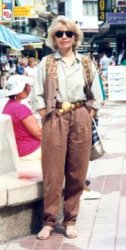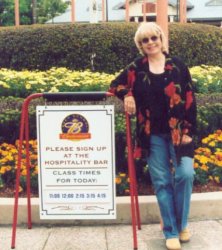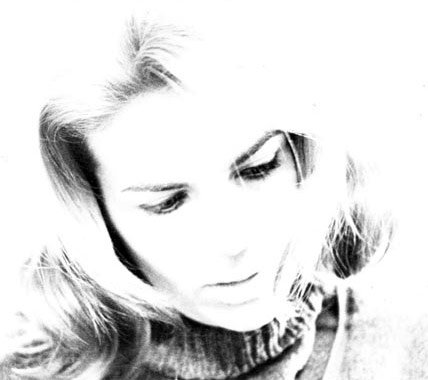

Her name, like her music, is at once lilting and consonant; fluid yet powerful. Although songwriter Fangette Willett published only a concise handful of songs during her career, she saw - literally, in some cases - those songs recorded by some of the biggest names in the business, and then, as if having cleared her system of the bug, simply moved on to other things.
She achieved success with almost unprecedented swiftness, selling a song - to a major publisher, no less - with her first knock on her first door. Her career went on to encompass staff writing positions at Columbia and Motown, sponsorships by Chip Taylor and Smokey Robinson, cuts of her material by Billy Eckstine and Lou Rawls, friendships with Van McCoy and Mama Cass, brushes with The Spinners and John Denver, and, above all, an enduring love story sparked by her most enduring song.
That number, "Dark Shadows And Empty Hallways", has come to attain an elevated status among '60s pop fans, particularly in its definitive version, a striking piece of Girl Group Gothic by British teenager Tammy St. John. "Dark Shadows" has also experienced more recent reverberation, having inspired the haunting "No Rainbows For Me" by postmodern British popsters St. Etienne.
I first learned of Fangette through her son Jason, a longtime friend who is himself a brilliant musician and songwriter. The more Jason told me about his mother, she of the lilting and consonant name and the '60s songwriting career, the more intrigued I became, until one day I realized I simply had to ask to interview her. She graciously accepted my request, and turned out to be a delightful subject, full of great stories, fascinating insights and vivacious humor. Still active and youthful at age 68, Fangette recounted for me some of the highs and lows of her career, and of her life.
|
Fangette Willett in recent years. |
||
The D.C.
I was born and raised in Washington, D.C. I grew up on Connecticut Avenue. My parents started me on piano with a teacher when I was five years old. I was Russian-trained - my father was a doctor, my mother was an opera singer, and they got me the best. I studied it all the way until my second year of college [1].
I wrote my first piece of music when I was three years old. I always heard the music; it was in my head. It got to the point where if I didn't acknowledge it, it wouldn't let me sleep. In the middle of the night, it would play over and over and over until I was forced to get up and write it down. Even if I didn't have a piano at hand, I was able to sit and write down anything, no matter where I was. When I write I hear a finished product in my mind, so I hear every instrument that I need. But if I don't write it down very quickly it can disappear, and so I learned to carry a tape recorder with me wherever I go.
Chopin, not Cher
One day a friend of mine said, "I'm gonna show you a kind of music that you never heard before." I said OK, so around lunchtime he picked me up and we went to downtown D.C. to the Howard Theater. I had never heard of R&B. We went down there and saw Smokey, The Temps, The Four Tops, Jerry Butler, The Staple Singers, who were fabulous. After that I thought I was black for three years! I didn't know anything about this music; it was never allowed in my home. Later on, when I got a job with Motown, my mother, who was from the South, was too embarrassed to tell anybody that I was working for a black company. She told everybody I was writing for Cher, which is something I would've been embarrassed by!
I went out immediately and bought the Top 10 records. I listened over and over to what the rhythm patterns were. I happened to love Chopin, and I wondered what it would sound like if I took Chopin's chords and inverted them and turned them into R&B. I started messing around like that, and got spectacular results. I didn't know anybody in the music industry; I didn't know how it was done. All I knew is that when I finished writing I felt that I had something good.
I wrote a whole bunch of songs, and I went to New York and started playing them - auditioning. And I sold the first time I was out. I was so naïve I thought that everybody would want to see me. So I got dressed up and went into April-Blackwood [2], which was the first one I ever went to. I went in there and was asked, "Do you have an appointment?" I said, "No, I'll wait." They must've thought I was crazy. I waited for over three hours. Finally a fellow named Dick Heard opened his door and saw me in. I played him a song I'd written called "That Empty Feeling", and he bought it right away. And that was my very beginning.
Writing off singing
I was dating a fellow in New York who was an arranger, for Count Basie and Connie Francis. Because I'm so soft-spoken, at one point he told me, "I'm gonna make you into another Marianne Faithfull." I didn't even know who Marianne Faithfull was! He took me into a recording studio, and brought some big-shot executive from Columbia Records in to hear me. Then he gave me one of my own songs to do, which turned out to be out of my range. I can't sing very well anyway. Anyway, he put me on a stool, put the headphones around my ears, then said to me, "Sing." When I opened up my mouth to sing, about 20 frogs jumped out! It was an absolute disaster. They got up and left, and that ended my singing career.
But it didn't bother me at all. I never wanted to sing - I'm a writer. Later, at Motown, I was given an opportunity to learn to do producing, but I didn't want to produce either, I just wanted to be left alone to write. I felt I could do my best work if I didn't try to be a jack of all trades and master of none.
Judy, Judy, Judy
The first record ever made of one of my songs was "Baby", by Judy Henske. Judy and I both had the same manager, Herb Cohen, before he discovered Frank Zappa. When he was recruiting me Cohen told me he'd set up a publishing company named Fangette Music to handle my songs, but what I didn't find out until much later was that he cut himself in for 100% ownership of Fangette Music, leaving Fangette herself with nothing! Based on that experience, once Cohen and I parted company I never worked with a manager again.
At any rate after she cut my song I decided I'd like to meet Judy, so I called her up and made an appointment to come by. My mother always taught me that when visiting someone to never show up empty-handed, and so when I got near her apartment, I stopped in at a bakery and bought a nice loaf of bread to bring up to her and her brother-in-law, Jim Yester, who was also visiting. I had just come in from D.C., and had paid for my cab with a $100 bill, getting back a $50 among my change. When I went to use the $50 to pay for the bread, however, it was just my luck that some cops happened to be shopping in the bakery, and they happened to be on the alert for counterfeit $50s that were going around. Of course, the one I handed the cashier turned out to be one of those fakes, and the cops sat me down for an interview right there in the bakery.
They let me go once it became clear that I was not responsible for the
counterfeit, but they kept my $50 as evidence. I was certainly in no position
to give up that kind of money so easily, but the cops insisted a replacement
would be sent to me in the mail. Well, even as green as I was at that
time I was still pretty skeptical about such a claim. Sure enough, though,
a few months later I received an envelope in the mail from the U.S. Treasury,
inside of which was a crisp, brand-new $50 bill.
Cass was a sophomore
I knew Cass Elliott from Washington. We met at a restaurant there named Clyde's, when she was in The Mugwumps. We used to go to New York together, to go on auditions. I had the car but not the money, and she had the money but not the car. We stopped going when I got my contract with Motown, and shortly after that she took a trip to the Virgin Islands, to meet up with John Phillips and form The Mamas & The Papas.
Dark Shadows And Empty Hallways
At April-Blackwood I ran into Van McCoy. He said to me, "What have you got?" and I showed him "Dark Shadows And Empty Hallways". He said, "Just sit right there," and he brought Chip Taylor in [3]. He said, "Play the song for Chip," and Chip made me play it about 20 times. Then he said he loved it and he wanted it.
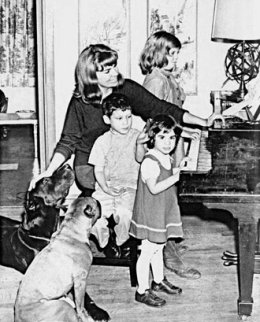 |
|
Fangette with her brood |
"Dark Shadows" was probably the second song I wrote. I'd been going through a separation with my husband, and I was badly torn up by it. He had walked out and left me with three children, and part of the song comes from that. I was writing about my own unhappiness. I wore my feelings on my sleeve. Somebody would call me and say "I just heard your song," and they'd know what was happening in my life, because everything I wrote pertained to my life.
A girl named Tammy St. John [4] did the first version of "Dark Shadows And Empty Hallways". She was from London, and 14 years old at the time. I was in shock when I heard her version, because I didn't picture the song the way she was doing it. They made the arrangements [5] so very heavy, where I had made them very light. I don't know what I was thinking, but I knew that I wasn't ready for her version. I got used to it, though, and then wrote to Tammy St. John - not knowing that she was 14 years old - and said, "I don't know who you are, but I want to thank you for the lovely version that you did." She wrote back, thinking that I was a man, of all things. I was too embarrassed to tell her that she had made a terrible mistake. I thought she was older, and she thought I was a man!
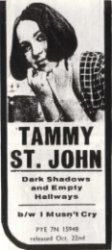 |
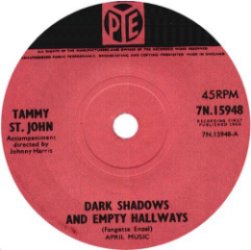 |
My son Jason recently found a web group where they were all talking about "Dark Shadows". One of the people on it, a DJ from England, said, "I don't know what the person went through who wrote that song, but that person must have gone through hell." So I wrote back and said, "Yes, I did. I did walk through hell. And it's amazing that I came out of it alive." You never think about a broken heart, but it really is a broken heart. And it can mend, but I was too young to know that at the time.
I wrote part of "Dark Shadows" while working at a clothing store. Later I was let go from that job because the manager caught me writing music in the dressing room! The middle part of the song was written at a children's playground, and the rest at home, at the piano. The song didn't come easily - it took a few months to finally get it down and finish the lyrics. I guess I owe my ex for that song, as he drove me to it.
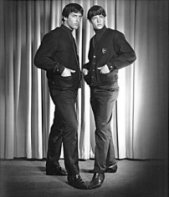 |
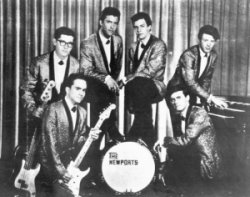 |
|
|
Left: Tom and Charlie Willett. Right, The Newports, L to R: Bill White (bass), Blaine Smith (gtr), Tom Willett (voc), Charlie Willett (voc), Donny Williams (drums), John Heard (piano). |
||
Then again, I met my current husband through the song. He was in a group called The Newports, from Washington, along with his brother Charlie. They had a couple of records out, including one on Laurie [6]. Tom was the lead singer. He's a powerhouse singer - just fantastic. And he's still got it! Anyway, his manager told me The Newports wanted to cut "Dark Shadows", but I tried to talk him out of it because I didn't know them. So I said, "Look, send the Willett brothers to the house, I've got some new material." It was a cold winter night. They knocked on the door, and I opened it and saw Tom there with his brother. I looked in his eyes, and it was like a lightning bolt hit me, and I knew that that would be the man I would marry. He didn't know it - I had to convince him. But I did, and that was 38 years ago.
(Chad) Mitchell Trio
I met the Mitchell Trio [7] just before I got married, through my manager, John Desmond, who knew them. When the group was in D.C. to do a show, we told Joe Frazier [8] about "Dark Shadows". Joe said he'd like to hear the song, but we'd have to do it at my house, and I'd have to ride on the back of his motorcycle. It was the most nerve-wracking trip of my life! I played him the song, he liked it and they took it.
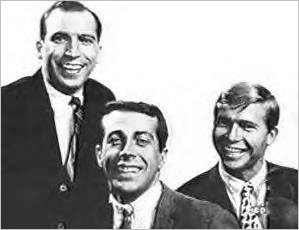 |
|
The Chad Mitchell Trio, minus Chad Mitchell, plus John Denver. |
Walter Jackson
I got a contract with Metric Music, in New York. They published "It's An Uphill Climb (To The Bottom)", which was recorded by Walter Jackson. I was at Columbia Records one day, and I was walking down the hall when I heard this exquisite voice singing a song called "Welcome Home". I asked Chip who that was singing. I said, "I have to write for that man - I want to write for that voice alone." He told me it was Walter Jackson, but we couldn't bother him, and Chip didn't know how to reach him.
A friend of mine named Tony Taylor ran the Bohemian Caverns in Washington, which was one of the best jazz clubs on the East Coast. It was later burned down in the riots. One day Tony called me up and said, "Fangette, your dream has come true - he's at the Tavern." He had Walter Jackson booked there. So I went down there during rehearsal and met Walter. He was suffering terribly from post-polio. Polio comes back when you're in your fifties, and when it comes back it really gets you. He had braces and everything - a very bad case. I have it also, and we became friends - like family almost. But his was a much worse case than mine, and he later died from it.
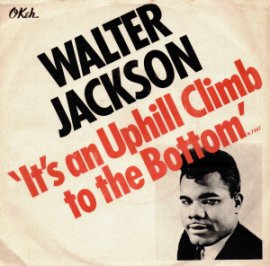 |
Walter's arranger, Riley Hampton, recorded "Uphill Climb" using 26 instruments and the CBS Orchestra. I was invited to come and observe the session, which was a first for me. Needless to say, I was thrilled! It was a hit [9], and then Lou Rawls recorded the song. The album his was on hit #7 on the Soul charts.
We visited Walter again after he recorded "Uphill Climb". He took us to Clyde's, and the minute we walked in the door they were playing "Uphill Climb"!
Motown
I went to see Smokey Robinson again at the Howard. This time I went down there with a song I wanted him to hear, even though I didn't realize how important he was at Motown. I got to see him, and played him the demo for "Uphill Climb". He said, "What do you want?" I said, "I want a job with Motown," and he said "You got it." I was so stunned I kept saying, "I don't believe you." And he'd say, "Well you better believe me. Get used to it. I'll send you tickets in a few weeks, and you'll fly up to Motown and you'll see how it is and how we work."
Smokey sent for me to come. I flew into Detroit, and there was a gold Cadillac sedan waiting for me - driven by The Spinners! They wanted to give me a really good hello, and they sure did. The company put me up in a wonderful hotel, and everything was charged to them - my food, travel expenses, the works. I was there for three days. I had to play for Mickey Stevenson. I played him "Forget You Ever Met Me, Baby" and "A Man Needs A Woman", and while I was there those songs were cut by Barbara McNair and Billy Eckstine [10].
I started to sit in on the Barbara McNair session, but I had to go back home before it was finished. The next time I went to Detroit, I got a lot of resentment from some of the other staff writers. They said, "We were here two-and-a-half years before we ever got a single." And I had two cuts in three days! So I wasn't Miss Popularity, even though I really wanted to be friends. I did become very friendly with Ronnie White, of The Miracles. I was so homesick - I missed my children. Ronnie took me to his house. He and his wife had three children. His wife would make dinner for us, then we'd play ping-pong.
I'm not into the industry politics - I don't like that kind of thing. You either have talent or you don't, and that's the bottom line. And if you don't, why are you there? Why are you writing if you're that kind of a person? A lot of that was going on at Motown - a lot. And a lot of gossip and intrigue, and rumors flying all over the place. It was really … not good.
Midnight Train To Clifton
After my Motown contract I was living in a town in Virginia called Clifton. At the time I knew a producer, whose name I can't even remember, who was trying to make it in New York. He would fly into Clifton twice a month to see what I was writing, and then take material back. One of those times, when he asked me, "What do you have?" I said, "I've been working on something. There's a train that comes by here at midnight, and I just love the sound of that train." And so I showed him "The Midnight Train To Clifton". He got excited, and he asked, "Oh, will you trust me?" I told him I hadn't copyrighted it yet, but he said, "Trust me - I'll have it out in two weeks." Like an idiot, I trusted him, and he did have it out in two weeks, only it was called "The Midnight Train To Georgia", and it won a Grammy - for someone else. It wasn't the same song as mine, but it had virtually the same title, and it had overtones of my things in it. [Songwriter Jim Weatherly wrote "Midnight Train To Georgia", originally as "Midnight Plane To Houston". Cissy Houston recorded it first, but to avoid confusion between her name and the song title, changed the locale to Georgia, and with it the mode of transportation from air to rail. Gladys Knight & The Pips quickly covered it, and the rest is history.]
I was sickened for three years over the experience. I remember going to a friend's house at one point, and she would have to lift my teacup for me because I was shaking too badly to do it myself.
Fanny the farmer
Around 1970 or '71 we bought a dairy-goat farm, which was 65 acres in the Blue Ridge Mountains. We lived in a log-cabin farmhouse, which was built shortly after the Civil War. My focus changed, and I got out of the music scene altogether. I was raising children, I had about 100 animals, and then I started an antiques shop, first in Leesburg [11], and then Tom built me a new shop right on our property. It was on the way to Harper's Ferry [12], which is very historic, so we got a lot of traffic from that. The sign read, "Antiques & Goats".
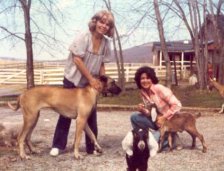 |
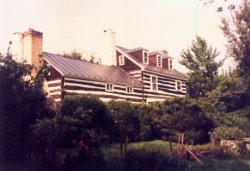 |
|
|
Fangette (in blonde) and friends at Sweetwater Farm. |
||
I named the farm Sweetwater. About five years later, I met a woman who told me the stream on the property, which was one of the tributaries that ran into the Potomac River, was named Sweetwater. I was floored!
The Torah Code
We moved from the farm around 1983. We sold everything, to be near a rabbi I found in Frederick [13], who was a teaching rabbi. That's when I started to study Orthodox Judaism. After services at this little schul on Saturdays, we'd all walk behind the rebbe and his wife to their house, and continue there. We'd all have lunch together, there'd be singing, women would be dancing. Then the men would sing the Shabbos songs, hitting their fists on the tables, and the walls would start to melt. It was incredible - I'd never experienced anything else like it. I was hooked, and I just had to be near this rabbi. I studied with him for seven years. I had been a Reformed Jew, but when I started learning from him, taking classes and everything else, I finally understood what being Jewish was all about. I finally learned the values, and what the Torah is talking about. The Torah is in code, and I never knew that. We moved away in 1990 to be near our daughter and her children, but I'm still in touch with him, and I still consider him to be my rabbi.
Writing for children
Through the rabbi's influence, I wrote a story that I dedicated to my son, called The Boy Who Found Hashem. That was my second book; the first one was Jonah, The Mouse And The Goat. That story takes place in the Virgin Islands. We founded Kinderword Press to publish them. The libraries in Maryland took them, Barnes & Noble in Maryland took them, and I did readings at Barnes & Noble. Nothing ever prompts me to write. I'm just a conduit. I have no control over it - it just comes.
| Editor's Notes: | |
| 1. | At American University, also in D.C. |
| 2. | Song publisher owned by Columbia Records. |
| 3. | Both McCoy and Taylor were staff writers with April-Blackwood. |
| 4. | Née Judith Coster. |
| 5. | Produced by Johnny Harris; the arranger per se wasn't credited. |
| 6. | "I Want You" / "The Trouble Is You," Laurie 3327, 1966. |
| 7. | Originally The Chad Mitchell Trio, but when Chad Mitchell left in 1965 for a solo career, they had to change the name; his replacement was John Denver. |
| 8. | The group's lead singer; oddly, Mitchell himself had been neither leader nor lead singer, but lent his name to the group because "it sounded best". |
| 9. | #11 on Billboard's R&B chart, and #88 Pop. |
| 10. | Respectively. |
| 11. | Virginia. |
| 12. | West Virginia. |
| 13. | Maryland. |
|
Sincere thanks for help in the preparation of this
story go to Jason Willett, S.J. Dibai, Mick Patrick, Simon White,
Phil Chapman, Michael Robson, Gary Myers, Jeff Lemlich, Martin Roberts,
|
|

